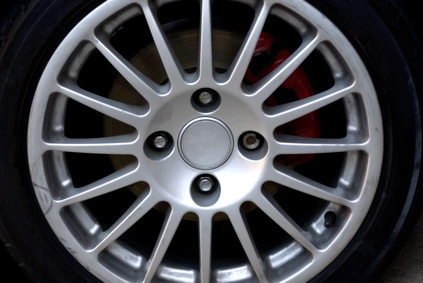
A vehicle's brake system consists of the brake pads, rotors and calipers. Each is crucial to the performance of the vehicle. When brake pads need to be changed, there are several warning signs: the brake light will remain on, the steering wheel will shake or the brakes may squeal when you use them. Occasionally, even after replacing the brake pads, they will continue to make noise. The source of the noise can be tricky to find.
Check for grease. After changing your brake pads, it is important to put grease or a silicone substance between the pads and the calipers. The calipers press the brake pads down onto the rotors. Metal rubbing against metal will produce a squealing or scratching noise if the metal is not lubricated. To check for grease on the brake pads, you will need to jack up the car and then place jack stands underneath it and lower it down to rest on the jack stands. Loosen the lug nuts on the wheels using the tire iron, and remove the tire and inspect the pads.
Examine the rotor. To do this, you will also have to remove the tires. If the metal on the rotor is damaged or worn, it will cause noise when the brake pads contact it. The rotor may need to be shaved down so it is smooth. If it is extremely worn, it is best to purchase a new rotor. A mechanic will be able to determine if your current rotors should be replaced.
Determine what type of metal your brake pads are made of. Some smaller car models frequently have brakes that make noise simply because of the type of metal on the brake pads. Cars like these usually have semi-metallic brakes which are better at stopping the car, but can produce unwanted noise.